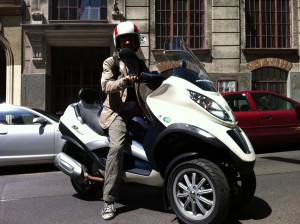During the past weekend, an event called „STARTup Live“ in Vienna (Austria/Europe) showed the potential of European startups: Several entrepreneurs presented their ideas, formed teams, worked on the concept for a weekend and finally pitched the results to a jury of experts – the best results were awarded with prizes, such as space in an incubator or marketing budget.
There was a broad variety of projects and ideas coming up; and some of them are adaptable for other markets as well. Here is a list of the hottest startups in Austria:
Finderly: Finderly helps people to purchase the right electronic product by asking friends online. During the weekend, the team developed a Facebook game, in which users can challenge their friends considering knowledge on IT-topics.
City Pulse: City Pulse is a mobile app which helps you find the coolest places in your town. It is not another social network, and therefore does not require registration – it simply connects existing networks. Revenue is generated by selling advertising space to providers of popular locations.
dreamA.tv: DreamA.tv is part of a creative community located in the Austrian countryside, close to the Hungarian border. The aim is to become a „soundcloud for video“, and provide a plattform for alternative documentary movies.
Teenage Rockstar: „American Idol meets MySpace“ is probably the most appropriate description of this project. Here, a platform is provided to young musicians who are not more than 19 years old. They receive mentoring by professional musicians and may even win record deals. The website is live for two years now; with 15.000 registered users in the German-speaking area, 3000 videos were uploaded. A turnover of 350.000 Euro was generated with premium accounts, ads, merchandising and licensing.
Roofnode: The aim of Roofnode is to bring highspeed internet to the countryside, with a prospected market size of 300 million people. This is solved by not having one single antenna in the middle of a village, but several antennas on rooftops across the village. The Austrian patent was obtained, the international patent is pending.
World taxi: „Don’t get lost in translation when ordering a taxi abroad“, is the key message of this project: The World taxi mobile app helps to order taxis worldwide. The app locates the user, asks him for his destination and forwards the information to a taxi nearby.
Newsletter platform: As the name of the project suggests, this is a platform on which users can subscribe to newsletters. Monetization will happen among other strategies by selling the top 3 places in the list. According to the founders, this will already cover the costs; revenue will be generated through premium accounts.
Circus offers: Marketing-officers are nowadays confronted with more than 200 promotion channels – e.g. new media in addition to TV, radio and print. Every single one has it’s own analysis and it’s own reports – so people in charge find themselves easily in „Excel Hell“. Therefore, the founders decided to build a tool for promotion management, called „circus offers“. It is supposed to save time and money by helping to choose the right promotion channel. Currently, Mc Donald’s is the only existing customer.
Cakadoo: Cakadoo aims for two target groups: Managers who work ten hours per day and don’t have time to do the dishes; and students who are willing to work a bit to gain some extra money. With Cakadoo, the manager posts the task, which is immediately forwarded to a student; the owners of the website receive 15 percent of the salary generated. Potential is also seen by cooperating with the HR-departments of big corporations.
Defect Detection: In order to detect defects on construction sites, the engineer has a camera, a voice recorder and a construction plan. Now, he can see all of this in just one app on his tablet PC; if a defect is detected, it is marked on the virtual construction plan, and the people responsible get informed. The founders are now working on a prototype product.
GetInspired: A social network for creative people, which works via microinspirations: Questions are asked in short sentences, other people can upload their ideas. For trading the ideas, the founders have created their own currency, „bulbs“, which can be converted into real money.
Lingibli: A tool to help people to learn languages. After selecting their own language and the language they want to learn, users print out qr-codes. With a mobile app, they can scan the codes and then learn the correct pronunciation of several words and sentences in the foreign language. The founders want to go live on July 13th.
TarifAgent.com: In Austria, there are 15 different network operators; 134.012 combinations of tariffs are possible. TarifAgent.com helps Austrians to save 22,4 Euros per month by choosing the correct tarrif. This is done with an app that tracks all data traffic, SMS sent and calls made. After 30 days, the app sends data to the company and automatically calculates the best tariff.
Prizes were finally given to City pulse, RoofNode, teenage rockstar and finderly; the voting was carried out by jury decisions and SMS-votings. What do you think? Which idea inspires you most?

